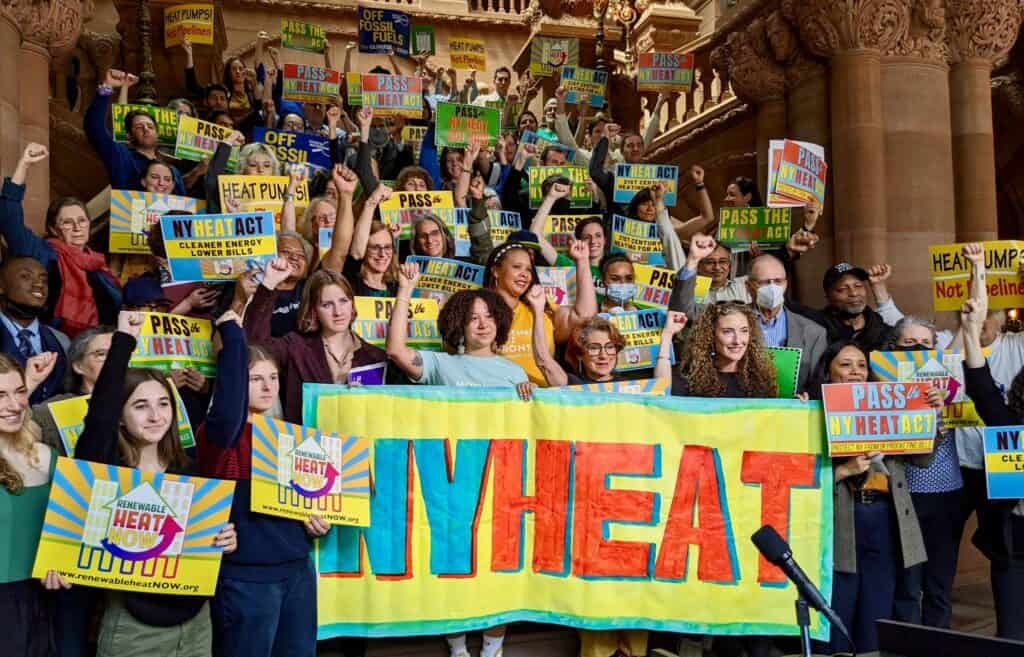
OP-ED By Anshul Gupta
Climate conversations often get mired in mindless money minutiae – how much will a certain climate policy cost and how will we pay for it – as if it was possible to put a price on civilization. But what if there was an impactful policy that didn’t cost a dime, saved money from day one, and helped relieve energy burdens while leading to healthful homes and communities?
Such Goldilocks policy options aren’t hypothetical; there’s one in front of New York State lawmakers right now – the New York Home Energy Affordable Transition or NY HEAT Act – a popular climate and energy affordability bill that deserves the legislature’s attention. Recently, advocates and elected officials, including members of the state assembly, Westchester legislature, and Yonkers City Council, held a rally calling on the state leadership to pass the Climate Jobs and Justice package of bills, including the NY HEAT Act.
The NY HEAT Act will lower home energy bills for millions of New Yorkers by directing the state’s Public Service Commission to limit the average energy burdens of low-to-moderate income households to 6% of their earnings, which the Commission can accomplish while shielding higher earners from cost shifts. Just this provision of the bill could lead to average monthly savings of $75 or more on utility bills for families earning under 80% of Area Median Income, directly benefiting a large number of Yonkers households. It’s no surprise that the Black, Puerto Rican, Hispanic, and Asian Legislative Caucus, whose legislative leaders Senator Stewart-Cousins and Speaker Heastie are also the State’s legislative leaders, has included NY HEAT among its end-of-session priority bills.
This bill, however, does a lot more than provide short-term relief from escalating home energy bills; it helps all gas customers of all incomes and protects existing natural gas customers from spiraling prices.
Many New Yorkers are unaware that outdated state laws allow gas hookups worth thousands of dollars each to be given away at no or minimal cost to new customers. Existing customers are forced to pick up the tab that grows by about $200 million each year, raising everyone’s gas bills. Luring new customers with ratepayer funded free hookups adds tens of thousands of dekatherms of unnecessary gas demand, which increases upward pressure on supply prices. With the US becoming the world’s largest exporter of liquified natural gas, the era of cheap natural gas is over.
Dug up streets for old pipe replacement are more than a traffic nuisance; these will also add billions to utility bills. The new pipes laid at the cost of $6 million per mile will be mostly empty in just a few decades, but utility customers would be on the hook to continue paying for them for years after these are retired. Just like new hookups, our outdated laws allow the utilities a 9–10% return on these investments at ratepayer expense.
Whether these are service lines for new customers or replaced mains, these costs are added to utility bills based on an anticipated 60–80 years of service life that the new pipes will never see – heating and cooking with gas isn’t just going out of style, it will also be out of compliance with New York’s climate law by 2050. Without squeezing the cost-recovery into a couple of decades, which will dramatically magnify the impact on gas bills, ratepayers could be on the hook to continue paying for decades after the pipes are retired.
There’s even more trouble brewing for existing gas customers. As gas bills increase, awareness of gas stoves’ serious health impacts grows, and heat pumps buoyed by federal and state incentives gain popularity, gas customers will increasingly make the switch to superior electric alternatives. This will leave fewer customers to bear the growing costs of the gas distribution network. Bill hikes will cause more customers to defect, raising the costs for those whose circumstances prevent them from making the switch or the most ardent gas-stove aficionados who prefer not to switch, setting a feedback loop.
This isn’t just a hypothesis, but a conclusion that utility experts have arrived at after rigorous analysis. The NY HEAT Act has provisions for modernizing New York’s laws governing utility regulations to address each of these issues. Even Con Edison supports the key provisions of this bill and enacting forward-looking energy policies.
Last year, the state passed legislation backing utility thermal energy networks – a clean, efficient and cost-effective heating and cooling solution for entire neighborhoods. Strategically replacing the oldest, riskiest pipes with thermal energy conduits would build lasting energy infrastructure and offer a path for union workers with pipe skills to transition to a clean-energy future. The NY HEAT Act will clear legal hurdles impeding these labor-friendly networks.
It is unconscionable that despite lofty goals set by our climate law, we are still expanding the distribution network for fracked gas that leaks and pollutes everywhere from drilling to distribution to domestic appliances. And it’s even more unconscionable that we are doing this on the backs of our energy customers reeling under inflation while the gas utilities laugh all the way to the bank. Every day without NY HEAT is a day that we’re digging ourselves deeper into a climate and financial hole. Every day without NY HEAT makes meeting our climate and energy security goals harder and costlier in the future.
The recently passed NY State budget failed to do much to address affordability concerns of New Yorkers, especially individuals and families of modest means. Passing the NY HEAT Act is a chance for legislators to return to their districts after the session and tell their constituents that they did something for their cost of living.
Westchester resident Anshul Gupta is a Senior Policy Analyst with New Yorkers for Clean Power and a steering committee member of the NYS Climate Reality Chapters Coalition.





